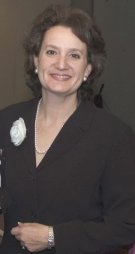Kay Bailey refuses to debate Barbara Radnofsky
 Texas Democratic Senatorial candidate Barbara Radnofsky (photo)
Texas Democratic Senatorial candidate Barbara Radnofsky (photo)
By Larry Romo
Chair of the Texas DemVets
Barbara Radnofsky has repeatedly called on Kay Bailey to debate and she just hides. She cannot hide from her voting record. That is why she does not want to debate. Hopefully the voters will read this article and they will ask her to debate. It is the right thing to do.VOTE RADNOFSKY FOR US SENATE!!
By Jim Eskin
Commentary in Express-News
It was 1858, and the people didn't even elect their U.S. senators yet — that power was in the hands of the state legislatures. But that didn't stop Abraham Lincoln and Stephen Douglas from staging a series of seven debates across the state of Illinois.
They laid out their positions plainly and honestly and clashed over differences in policy, but refrained from personal attacks. The sixth debate drew a crowd of 20,000, more than twice the population of Quincy, its site.
A lot has changed since then, but Democrats, independents and Republicans, liberals, moderates and conservatives, can agree that debates remain one of the most important sources of information about candidates.
They provide valuable firsthand information, stimulate discussion of timely issues and show us how candidates think on their feet. Mention political debates and most people think about the highest office in the land, but contests below the presidential level deserve as much, if not more, attention.
Far too often, the voters just don't know enough about those candidates and issues, and debates can play an essential role filling the void. Take the race for U.S. senator in Texas between the nominees of the two major political parties, the incumbent Sen. Kay Bailey Hutchison and Barbara Ann Radnofsky, the first time in history the contest is between women.
With so many pressing issues hanging in the balance this election year — Iraq, Iran, gas prices, health care, immigration, to mention just a few — the stakes are too high not to hear them exchange views on the future course of critical public policy. From several perspectives, televised debates for U.S. Senate and other statewide offices make sense.
They are cost-effective. Debates cost campaigns little or nothing compared to ads that consume a majority of most major campaign budgets. Debates are a crucial source of credible information about candidates. The Debate Advisory Standards Project, funded by the Pew Charitable Trusts, found that debates are preferred by voters as an information source over the candidates' own ads by more than a 7-to-1 ratio.
Debates nurture the most essential ingredient of our democracy — an informed, engaged citizenry. Debates come in many shapes and sizes. Four basic formats have emerged: a panel of journalists, a single moderator, a combination of panel and single moderator and a town meeting.
It is typically left to an independent group to serve as sponsor and work out these arrangements as fairly as possible. On the tricky question of third party candidates, perhaps we can follow the lead of the nonprofit Commission on Presidential Debates that has sponsored and produced all presidential debates since 1988 — candidates qualify by attaining a level of support of at least 15 percent as determined by selected public opinion polls.
Conventional wisdom has it that incumbents and front-runners will try everything to avoid debates. That has been overcome at the national level. Since 1976, presidential debates have become a tradition, and candidates ducking or appearing to block these events do so at great political risk.
Debates are routinely conducted for every political position in the nation, from president down to local races, to provide citizens the best possible information to make informed decisions. Texans deserve nothing less in choosing their U.S. senator, statewide office-holders and other key public officials. (Jim Eskin is vice president for Institutional Advancement at Our Lady of the Lake University)



No comments:
Post a Comment